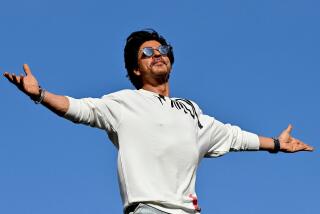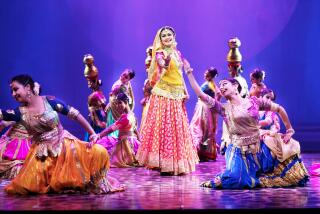Khan’s North Indian Songs Evoke Serenity and His Poetic Power
- Share via
To hear sarod master Ali Akbar Khan in concert is a supremely musical experience. Sunday night, joined by the formidable Zakir Hussain on tabla, Khan held a sold-out audience in happy captivity for a three-hour performance at UCLA’s Royce Hall. But beyond the purely musical, we’re increasingly reminded of Khan’s significance as a cultural ambassador who, for more than 40 years, has helped the West discover the deep, transfixing beauty of Indian classical music.
That music, in the North Indian Hindustani tradition, is fashion-proof and timeless, as witnessed on Sunday. Consisting of two sprawling, relaxed ragas, the concert nicely exemplified their time-expanding effect. If the music is inspired and the listener’s spirit willing, it can serve as a meditative tonic for anxious, attention-deficient Westerners.
Sunday’s performance opened with a long solo alap section, a statement of tranquil joy, immediately projecting Khan’s natural poetic power. Expansive melodic sections eventually yielded to more ecstatic, rhythmic fire. Khan, at 77, is utterly at one with his instrument, even when that instrument is more temperamental and in need of tuning than usual, because of travels. Occasionally, in some fast passages, his fingers aren’t quite as nimble as they once were, but he compensates with purity of feeling and raw vigor.
Virtually every gesture and nuance speaks of a radiant wisdom. God works in the details: through the shape of a glissando from the fretless, multi-stringed instrument, the specific character of an articulation--where and how intensely a string is plucked--or the percussive outburst of a hammer-on.
The remarkable Hussain, a percussionist who has worked in various culture-crossing projects, still goes the deepest in the classical tradition of his training, especially in the company of a master such as Khan or Ravi Shankar. Here, Hussain epitomized responsiveness, tapping into rhythmic impulses or catching phrase endings with sighing synchronicity.
Khan dipped briefly into Western kitsch with a reading of “Greensleeves,” but it was a forgivable distraction. At this point in his career, he’s entitled to take liberties.
But Khan’s main gift has little to do with East meeting West schemes. The trick is to honor a long musical legacy and to enter into a place of worshipful alertness. Khan is one of the greatest living masters at finding that place, and digging in, as he did on Sunday.
More to Read
The biggest entertainment stories
Get our big stories about Hollywood, film, television, music, arts, culture and more right in your inbox as soon as they publish.
You may occasionally receive promotional content from the Los Angeles Times.










